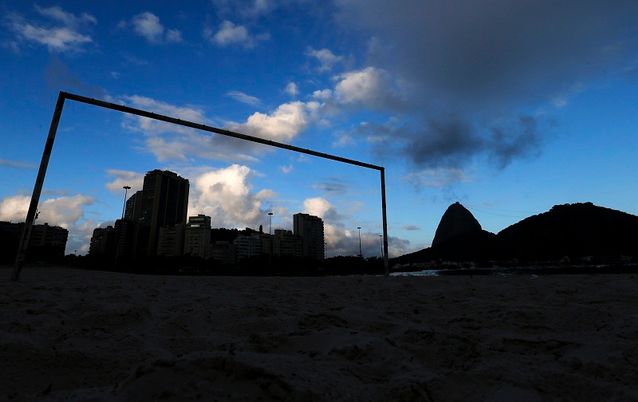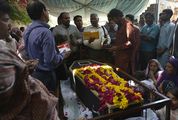FOOTBALL fans worldwide are readying themselves for five weeks of wall-to-wall football, and as the World Cup opens in Brazil next week, South Africans will be reminiscing wistfully about the heady days of our own 2010 Soccer World Cup.
But this time the tournament is overshadowed by controversies and protests in ways that SA’s was not four years ago. On the one hand there is deep scepticism about the benefits the tournament really brings to an emerging market economy such as Brazil’s, a scepticism likely to make 2014 the first World Cup to attract widespread popular protest — but alongside the popular enthusiasm that can be expected in "the country of soccer".
On the other hand, the stench of corruption that has always surrounded Fifa is smellier than ever, with the UK’s Sunday Times reporting at the weekend that a senior Qatari official paid about $5m of bribes to Fifa officials in 2010 to ensure the vote went Qatar’s way for the 2022 World Cup.
Brazil will probably live up to its lastminute.com reputation and make sure everything comes together somehow, but the chaos around the 2014 World Cup preparations allows SA to feel at least a little smug about its own efforts.
Not that there were no doubts about whether SA would be ready in time. But Brazil is not only not ready yet. It hasn’t built some of the infrastructure it had planned at all — a $16bn bullet train between Rio and Sao Paulo was cancelled, and several construction projects remain unfinished, amid overspending, allegations of corruption and bureaucratic squabbles.
Even so, this is the most expensive World Cup yet, with an $11.5bn price tag, including no less than $3.6bn of taxpayers’ money that has gone into stadiums. And Brazilians are angry about how little the tournament is doing to boost growth in their ailing economy.
They demonstrated their anger when a million of them protested last year. There have been protests again recently and more are likely in the coming weeks. For many Brazilians, as the Wall Street Journal put it, "the Cup has become a symbol of the unfulfilled promise of an economic boom".
Brazil is in its fourth year of an economic slowdown. The jobs, tourism and spending the Cup will inject will have little effect. And there is huge popular resentment about the contrast between what is being invested in the Cup and persistent poor public healthcare and infrastructure.
As SA experienced, the Fifa stranglehold means the benefits flow disproportionately to Fifa and the Blatter family, not to entrepreneurs in the host nation. And that is just the above-board side of Fifa. The growing calls for the Cup to be taken away from Qatar highlight the dodgy dealings for which there is growing evidence.
The decision to award the 2022 Cup to Qatar has been questionable from the start, given that it had no football infrastructure, nor fans, nor indeed any footballers — it has had to buy itself a national team. And Qatar’s searing summer temperatures have made the whole thing even more absurd. The maltreatment of labourers working on the construction sites have added to the cloud over Qatar’s Cup.
Even before the 22 Fifa executive committee members voted, there were accusations some were bribed. The latest UK reports claim to be based on extensive evidence that four African members of the committee, in particular, took cash in return for switching their votes to Qatar. All allegations have been denied. But there are growing calls for the vote to be taken again.
All this raises the question why the world lets Fifa continue to monopolise the World Cup. But when the opening match begins next Thursday evening, it will all be forgotten by the football fans. For a while, we’ll just enjoy.

A goal post is seen on Botafogo beach, with Sugar Loaf mountain in the background, in Rio de Janeiro, Brazil. Picture: REUTERS
FOOTBALL fans worldwide are readying themselves for five weeks of wall-to-wall football, and as the World Cup opens in Brazil next week, South Africans will be reminiscing wistfully about the heady days of our own 2010 Soccer World Cup.
But this time the tournament is overshadowed by controversies and protests in ways that SA’s was not four years ago. On the one hand there is deep scepticism about the benefits the tournament really brings to an emerging market economy such as Brazil’s, a scepticism likely to make 2014 the first World Cup to attract widespread popular protest — but alongside the popular enthusiasm that can be expected in "the country of soccer".
On the other hand, the stench of corruption that has always surrounded Fifa is smellier than ever, with the UK’s Sunday Times reporting at the weekend that a senior Qatari official paid about $5m of bribes to Fifa officials in 2010 to ensure the vote went Qatar’s way for the 2022 World Cup.
Brazil will probably live up to its lastminute.com reputation and make sure everything comes together somehow, but the chaos around the 2014 World Cup preparations allows SA to feel at least a little smug about its own efforts.
Not that there were no doubts about whether SA would be ready in time. But Brazil is not only not ready yet. It hasn’t built some of the infrastructure it had planned at all — a $16bn bullet train between Rio and Sao Paulo was cancelled, and several construction projects remain unfinished, amid overspending, allegations of corruption and bureaucratic squabbles.
Even so, this is the most expensive World Cup yet, with an $11.5bn price tag, including no less than $3.6bn of taxpayers’ money that has gone into stadiums. And Brazilians are angry about how little the tournament is doing to boost growth in their ailing economy.
They demonstrated their anger when a million of them protested last year. There have been protests again recently and more are likely in the coming weeks. For many Brazilians, as the Wall Street Journal put it, "the Cup has become a symbol of the unfulfilled promise of an economic boom".
Brazil is in its fourth year of an economic slowdown. The jobs, tourism and spending the Cup will inject will have little effect. And there is huge popular resentment about the contrast between what is being invested in the Cup and persistent poor public healthcare and infrastructure.
As SA experienced, the Fifa stranglehold means the benefits flow disproportionately to Fifa and the Blatter family, not to entrepreneurs in the host nation. And that is just the above-board side of Fifa. The growing calls for the Cup to be taken away from Qatar highlight the dodgy dealings for which there is growing evidence.
The decision to award the 2022 Cup to Qatar has been questionable from the start, given that it had no football infrastructure, nor fans, nor indeed any footballers — it has had to buy itself a national team. And Qatar’s searing summer temperatures have made the whole thing even more absurd. The maltreatment of labourers working on the construction sites have added to the cloud over Qatar’s Cup.
Even before the 22 Fifa executive committee members voted, there were accusations some were bribed. The latest UK reports claim to be based on extensive evidence that four African members of the committee, in particular, took cash in return for switching their votes to Qatar. All allegations have been denied. But there are growing calls for the vote to be taken again.
All this raises the question why the world lets Fifa continue to monopolise the World Cup. But when the opening match begins next Thursday evening, it will all be forgotten by the football fans. For a while, we’ll just enjoy.




















Change: -0.47%
Change: -0.57%
Change: -1.76%
Change: -0.34%
Change: 0.02%
Data supplied by Profile Data
Change: -1.49%
Change: -0.01%
Change: -0.47%
Change: 0.00%
Change: -0.08%
Data supplied by Profile Data
Change: 0.61%
Change: 0.85%
Change: 0.20%
Change: -0.22%
Change: 0.82%
Data supplied by Profile Data
Change: 0.27%
Change: -0.42%
Change: 0.13%
Change: -1.22%
Change: -1.88%
Data supplied by Profile Data